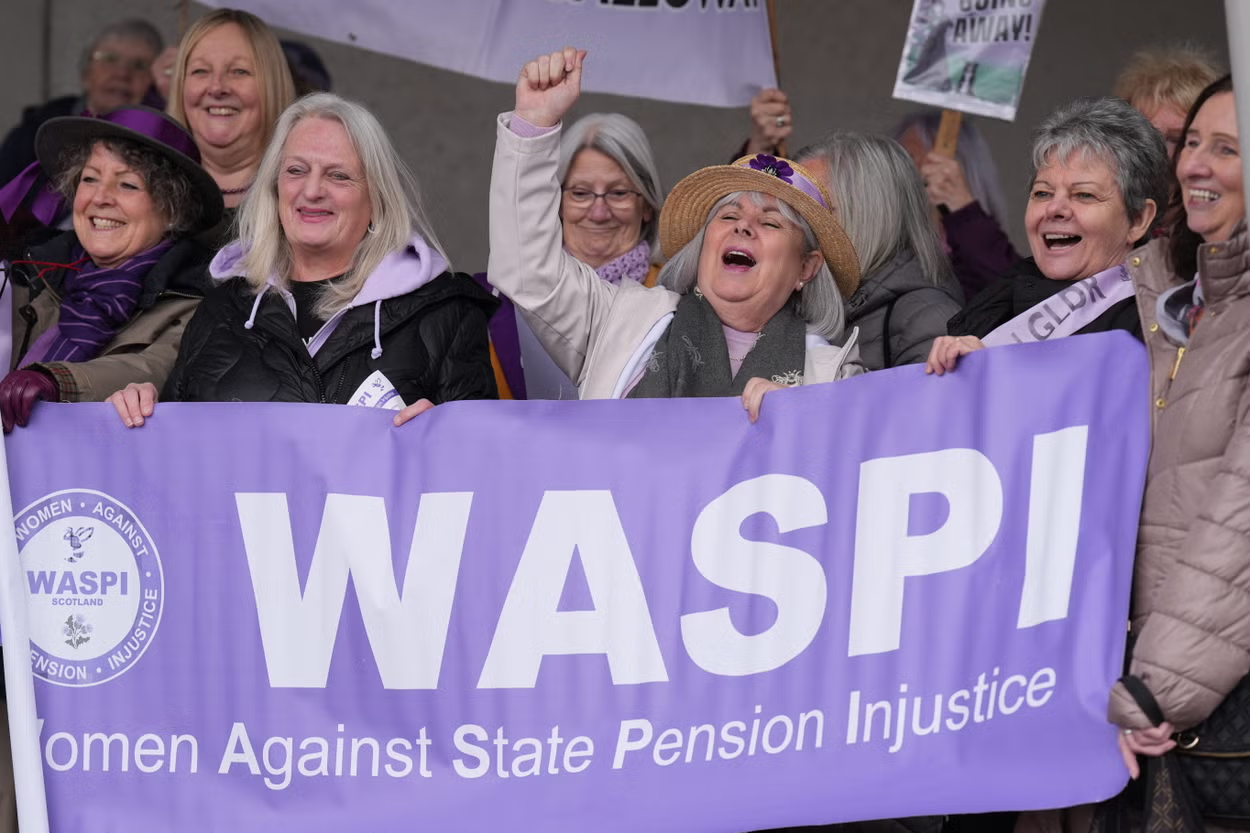Table of Contents
Togglewaspi compensation latest news today on the Fight for Fairness
Image Credit: The Independent
Introduction:
The Women Against State Pension Inequality (WASPI) campaign has been a significant movement advocating for justice for women born in the 1950s who faced unexpected changes to their state pension age. These alterations disrupted retirement plans, leading to financial hardships for many. As of December 2024, the fight for fair compensation continues to evolve, with recent developments shedding light on the government’s stance and the campaign’s progress.
Background of the WASPI Campaign:
The Origin of WASPI
Established in 2015, WASPI emerged to address the grievances of women affected by the accelerated increase in the state pension age. The campaign’s primary objective is to secure fair compensation for the lack of adequate notice regarding these changes, which left many unprepared for delayed pension access.
State Pension Age Changes
The Pensions Act 1995 initiated the equalization of the state pension age for men and women, gradually raising women’s pension age from 60 to 65. Subsequently, the Pensions Act 2011 accelerated this process, further increasing the pension age to 66. These rapid changes, coupled with insufficient communication, significantly impacted women born in the 1950s.
Impact on 1950s-Born Women
The abrupt adjustments meant that many women had to reconsider their retirement plans, often extending their working years unexpectedly. This led to financial strain, with some unable to bridge the income gap, resulting in hardships such as debt accumulation and reliance on benefits.
Read Also: pip assessments dwp changes: Comprehensive Guide to Updates and Impacts
Progress in the Fight for Fairness:
Parliamentary Debates
The plight of WASPI women has been a recurring topic in parliamentary discussions. MPs across parties have raised questions and participated in debates, urging the government to address the injustices faced by these women. Despite these efforts, a definitive resolution has remained elusive.
Public Support and Media Coverage
Media outlets have played a crucial role in highlighting the challenges faced by WASPI women. Coverage in newspapers, television, and online platforms has amplified their voices, garnering public sympathy and support for their cause.
Legal Challenges
WASPI has pursued legal avenues to seek redress, including judicial reviews challenging the government’s handling of pension age changes. While some cases have not yielded favorable outcomes, they have kept the issue in the public eye and maintained pressure on policymakers.
Recent Developments in WASPI Compensation:
Ombudsman’s Findings
The Parliamentary and Health Service Ombudsman (PHSO) conducted an investigation into the Department for Work and Pensions’ (DWP) communication regarding state pension age changes. The PHSO found instances of maladministration, noting that the DWP failed to adequately inform the affected women, leading to significant injustice.
Government’s Response
In light of the Ombudsman’s findings, the government has acknowledged the issues raised and expressed a commitment to addressing them. However, specific details regarding compensation packages and timelines have been limited, causing frustration among campaigners.
Campaigners’ Reactions
WASPI leaders have welcomed the Ombudsman’s findings as validation of their long-standing claims. However, they continue to advocate for prompt and fair compensation, emphasizing the urgency given the age and financial situations of the affected women.
Current Status as of December 2024:
Compensation Proposals
Recent reports suggest that the government is considering compensation packages for the affected women. While exact figures have not been officially confirmed, discussions indicate that the amounts may not fully cover the financial losses incurred, leading to concerns about the adequacy of the proposed compensation.
Implementation Timeline
The government has indicated that an announcement regarding compensation will be made in the coming weeks. However, without a concrete timeline, many affected women remain skeptical. The delays in addressing this issue have further eroded trust between the WASPI campaign and policymakers. Campaigners have called for immediate action, stressing that time is of the essence, as many impacted women are nearing or already in retirement.
Ongoing Advocacy Efforts
Despite government reassurances, WASPI supporters have intensified their advocacy. Social media campaigns, petitions, and local events continue to draw attention to their plight. The group is also working closely with legal and financial experts to strengthen their case, ensuring that the government recognizes the gravity of the situation.
Challenges and Controversies:
Disputed Compensation Amounts
One of the most contentious issues revolves around the adequacy of proposed compensation. Reports suggest that while the government is considering a financial settlement, the sums discussed may not reflect the actual losses and hardships faced by the women. Critics argue that anything less than full restitution undermines the spirit of justice.
Government Delays
The repeated postponements in releasing a compensation plan have fueled criticism. Campaigners and affected women have expressed frustration over what they perceive as bureaucratic inertia. These delays not only prolong financial hardship but also heighten the emotional toll on those waiting for resolution.
Public Perception
Public opinion on the WASPI campaign remains divided. While many empathize with the women’s struggle and support their call for fairness, others view the situation as a consequence of necessary pension reforms. The government’s handling of the issue has also drawn mixed reactions, with some praising efforts to address the matter and others criticizing the lack of urgency.
Personal Stories:
Individual Experiences
Behind the statistics are countless personal stories of resilience and struggle. Many affected women have shared their experiences of having to delay retirement, take on part-time jobs, or depend on family for financial support. These testimonials highlight the human cost of the pension age changes and underscore the importance of fair compensation.
Community Impact
The ripple effects of the pension age changes extend beyond individual women to their families and communities. Spouses, children, and dependents often bear the brunt of the financial strain. Communities with high numbers of affected individuals report increased reliance on social services and local charities, emphasizing the broader implications of the issue.
Financial Implications:
Cost to the Government
Providing compensation to the affected women poses significant financial challenges for the government. Estimates suggest that the total cost could run into billions of pounds, raising concerns about budgetary constraints. However, campaigners argue that this is a matter of justice, not economics, and that the government has a moral obligation to act.
Economic Impact
Supporters of the WASPI campaign highlight the potential economic benefits of fair compensation. With additional financial resources, affected women could contribute to local economies through increased spending, ultimately offsetting some of the costs of compensation.
Political Repercussions:
Party Positions
The WASPI issue has become a focal point in UK politics, with parties adopting differing stances. The Labour Party and other opposition groups have shown strong support for the campaign, pledging to prioritize the matter if elected. The Conservative government, while acknowledging the problem, faces criticism for its perceived lack of urgency.
Electoral Impact
The handling of the WASPI campaign is likely to influence upcoming elections. Analysts predict that constituencies with a high number of affected women could swing against the ruling party if substantial progress is not made. This makes the issue a critical point in the political landscape.
Future Outlook:
Potential Policy Changes
As public and political pressure mounts, there is growing speculation about potential legislative changes to prevent similar issues in the future. Policymakers are exploring ways to improve communication around pension reforms and ensure that affected individuals receive adequate notice of any changes.
Long-Term Effects
The outcome of the WASPI campaign will likely set a precedent for how the government handles compensation claims and pension reforms in the future. A fair resolution could rebuild trust, while a perceived failure may have lasting consequences for public confidence in pension policies.
How to Support the WASPI Campaign:
Joining the Movement
Individuals can support the WASPI campaign by joining local groups or participating in online forums. Becoming a member not only strengthens the movement but also amplifies its collective voice.
Donations and Fundraising
Financial support is crucial for sustaining the campaign. Donations help fund legal battles, advocacy efforts, and awareness campaigns. Organizing or participating in fundraisers is another effective way to contribute.
Raising Awareness
Spreading the word about the WASPI campaign is essential. Sharing stories, participating in social media campaigns, and engaging with local media can help bring the issue to a wider audience and maintain pressure on decision-makers.
Read Also: Top Benefits of dwp bank accounts for pensioners in the UK
Conclusion:
The WASPI campaign symbolizes the resilience and determination of women fighting for justice. While progress has been made, the journey toward fair compensation is far from over. The affected women and their supporters remain steadfast in their mission, urging the government to act decisively and compassionately.
FAQs:
- What is the current status of WASPI compensation?
The government is considering compensation proposals, but no final decision has been announced as of December 2024. - How can affected women claim compensation?
Once the government finalizes the compensation plan, affected women will likely be provided with guidelines on how to apply. - What has the Ombudsman concluded about the DWP’s actions?
The Ombudsman found maladministration in how the DWP communicated the state pension age changes, leading to significant injustice. - How has the government responded to the Ombudsman’s findings?
The government has acknowledged the findings but has faced criticism for delays in addressing the issue. - What are the next steps for the WASPI campaign?
The campaign continues to advocate for fair compensation, engage with policymakers, and raise public awareness about the issue.




